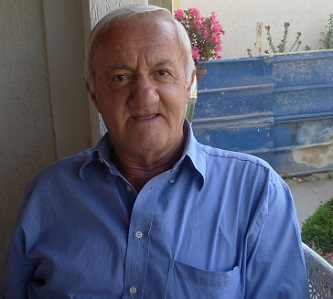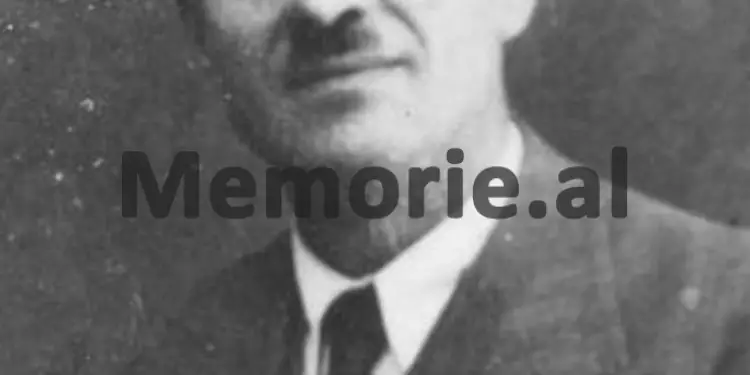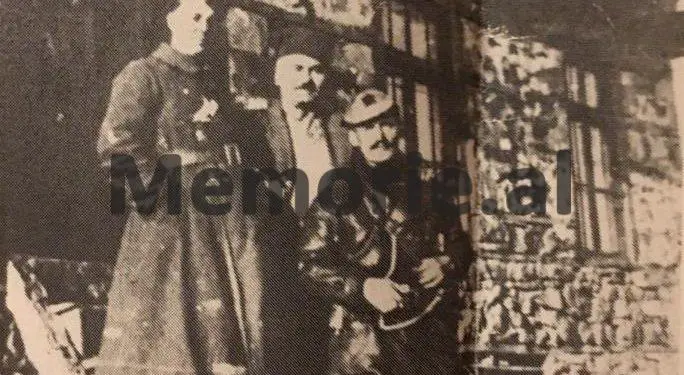By Hasan M. Shahinaj
Part One
Memorie.al / From time to time I have served you notices about the book “Riza Kishta, a name that will never be forgotten”, because that has been the reaction to it. Since its publication in 2020, it has been reprinted three times, within the first year it was read by about 5 thousand people, and over 20 articles have been written and published by various authors, such as critics, writers, historians and publicists. This time too, writes the researcher, writer, poet and publicist Hasan M. Shahinaj, who comes with an in-depth study published in several newspapers, from which I selected the publication of “Fjala së Lirë” in London. I am very grateful and thank: the author who has produced a serious and valuable work, as well as the publishers who publish it.
(Dr. Fatmrir Terziu)
A realistic, objective, highly valuable monograph.
I have in my hands, for a rereading and analytical-synthetic reflection, the monographic book by the well-known author Meçan Hoxha, entitled “Riza Kishta ëmer që nuk harrohet”, 2020 edition, also donated to me with an autograph, on June 10, 2021. In addition to gratitude to the author, for this gift exchange (because I also gave him my historical-pedagogical monograph “Shkolla Shqipe ëmer madhe e Trebishtit”, with 453 pages); I would like to emphasize that: the coincidental coincidence of the autograph of June 10, 2021, with the historical – famous and special date in our national history of June 10, 1878, that is, of the Albanian League of Prizren, obliges me to double my dedication to this book in the 14-volume series, published by the author Meçan Hoxha, who also in this special, rich and interesting monographic book, with the professional skills of a qualitative researcher and a genuine historian, makes, so to speak, an “autopsy” of the reality experienced by the living hero, Riza Xhemal Kishta, in time and space.
Therefore, at the beginning of the article, I would like to congratulate the skilled author, Meçan Hoxha, who has portrayed the character and personality of Riza Kishta, with true writing and research throughout his busy activity, in the two times he lived, dared, worked, resisted and triumphed as a true challenger of the strong, tough, characterful, brave, loyal, incomparable and very popular man; coveted among the generations of the time, even though he fatally lived only 52 years. Here are some key points of my simple scholarly reflection:
First:
The book “Riza Kishta, a name that will not be forgotten” meets all the criteria of the type of monographic prose; That is, the well-known and experienced author in this field (also in the books published in succession) has clearly carried out a historical-literary “radiological” scanner of the complex personality of Riza Kishta, with his own lights and virtues. This difficult work of several years by the author (since 1994, as he himself claims), extends the activity of the hero Kishta to the time frame of 1918-1949, that is, until his physical extinction.
Thus, in addition to the selection and selection of key biographical and self-narrative points of the monographic character; it requires so much prudence and care and historical-literary finesse, to reflect the main details originally, in order to individualize (but also typify) the character with his particular virtues, faced with the circumstances, the administration and the superstructure of the two regimes, currents and other currents.
In short, the author Hoxha, with his rich writing experience, takes the hero Riza Kishta by the hand, from the childhood ethnogenesis of the region, where he opened his eyes in 1897, in the village of Kishtë in Vërçë, Gramsh, until May 18, 1949, the fateful day of the cruel extermination by the communist regime. The objective, impartial perspective, attentive to every step and paragraph of the author Meçan Hoxha, has given us a different kind of monograph, compared to others; from what we have read and analyzed models of some subjectivist, emotional and formalist authors.
The author of the book Hoxha, knowing in detail the real history of the Gramsh region, in both times as above, dots the “i”, as it should and as the monograph requires in the objective historical-philosophical categories that: history is made by the people (here Gramsh is given extensively, as the marrow of the Fatherland, a worthy son of which until his last breath, Riza Xhemal Kishta was and remains just as worthy).
Time and only it evaluates or devalues people by their deeds and contributions (here Riza Kishta was tested by time several times and appreciated, deservedly evaluated, although with fluctuations and delays from our myopic structures). But Riza Kishta, followed and trusted him until the end, even today, the smart, brave, loyal, hardworking and hardworking people of Gramsh with their many vicissitudes, sheltering him at great risk, for 18 months like few others, so much so that our objective author rightly states through the proverb on p. 148 of the monograph: “He who loves you, hides you even under his tongue!”
Secondly:
The writer Meçan Hoxha, far-sighted and complete in his formation, not simply professional-writing, but I would say also psychological-historical, has keenly experienced the prolonged drama of Riza Kishta and, knowing well scientifically the role of relative truth (that absolute does not exist, according to Einstein); has portrayed the real, complex, historical-antifascist and patriotic hero of Riza Kishta, with prudence, patience, duration (we repeat, since 1994, as he himself claims), researching and collecting a mountain of historical archival-source facts as accurate as possible, sifted through a fine sieve; in addition to many written, documented memories of collaborators, publications, photos, facsimiles, stories, debates.
Mainly of ordinary people everywhere, inside the Homeland and abroad, from Gjirokastra, Dibra, Tirana, Kosovo, Macedonia, Montenegro, Italy, etc., to the persecuted family members and relatives or, every honest person who calls himself Albanian. Therefore, the monograph of the capable author Meçan Hoxha, is complete, true, objective, original in its kind; even attractive that keeps you in suspense with curiosity and at the same time anxiety for reading, rereading, reflection, especially today and in this day and age; when a part of our Albanian society, unfortunately the intellectual part, is wandering towards cosmopolitan currents (citizen of the world and denier of the Homeland), galloping digitalization, dizzying artificial technology, etc., etc., supposedly to become “modern”, surprisingly intentionally forgetting about our deep roots from where they really and ethnically originate and where we are going blindly and unjustly!
If you only reread and meditate on the chapter “Introduction” of the monograph, which is extensive, meaningful, abundantly illustrated and documented, with due attention and strong concentration; you will understand a lot about this well-written book of 200 pages, which (according to me, H.SH.), competes and wins full marks, without any hesitation, with every sister monograph, biography and written autobiography of this genre of Albanian prose, especially, I emphasize again, of documentary-memorabilial literature.
The well-known author Meçan Hoxha, with sincerity open to the impartial reader, truthfully shows the motives why he wrote this beloved and accurate monograph, about the public and political personality radiant on two planes in time and space, Riza Xhemal Kishta, discussed, anathematized, sympathized, and deluded for over a century in the region of Gramsh and beyond.
The pivotal motif of the writer Hoxha’s literary field is the historical-social truth of the personality of Riza Kishta; another motive, even the main one, is that: Riza, with his patriotic-antifascist and humane values of a high degree, with the courage and bravery of a man above men, stopped fratricide in Gramsh and its outskirts, in the turmoil of time and the destructive consequences of the two World Wars (from 1918 to 1949, when he was physically extinct, but not mentally and ideally…)
Riza Kishta was provoked, reviled, anathematized as a traitor, enemy and divisive even in the 60s-65s, until the 90s and after 90s, by those, the little people sold and bought by two pairs of regimes, the black souls. The ambitious, the incompetent, the hypocrites, the short-sighted who have been brought to us and are still being brought to us like that nasty rope of Pojani even beyond the grave!… (if I may say so metaphorically). The author Hoxha, clearly revealed to us the leitmotif of the drafting of this monograph, not easy to conceive and document, and then written so analytically-synthetically and convincingly, clearly paraphrasing Aristotle’s brilliant statement: “I love Plato, because I have him as a friend, but I have the truth as a friend”! The comment is clear, like sunlight!
However, those/those and these, falsifiers of the historical truth about Riza Kishta, what have they not slandered and fabricated carelessly about his figure, such as: exploiter, criminal, chief traitor who should have been killed. Even, a black tar self-praised in the Majlis (somewhere in the people), in the 1965s, supposedly he killed Riza, (see page 89 of the book), the poison of the shullani viper! While in fact Riza Kishta, has been and remains a personality in the full sense of the word, intelligent by nature, educated, twice a deputy during the Kingdom, a candidate for deputy even after the end of the War, on December 2, 1945 (although he did not accept, but he still won votes from the people).
His figure always radiated generosity and kindness to the poor, he helped them even with his own pocket money, with direct assistance to Albanian schools in the villages, except for his birthplace of Kishtë, for roads, non-payment of taxes to the regime, etc., etc., because he had been orphaned very early, but he was educated with skill, he became and served as a teacher, administrative secretary during the time of the patriotic doctor Refat Dyrmishi; career officer twice, up to the rank of first captain (even during the Anti-Fascist National Liberation War, the structures of the time promoted him to major) etc., which significantly eclipsed the regional agallars and beylers of Vërçë-Sulovë-Shënepremte and, to the other suburbs of Dumre-Myzeqe.
So, he was a personality formed as a model collaborator, a born democrat, an idealistic nationalist, free, with a pure soul, against hatred and fratricidal civil war; beyond envy, ambition, conflict. And, thus bravely as a man of resistance, he breathed his last without opening his mouth before the red executioners, in a hellish cell of the time, only 52 years old, at the peak of his age and energies.
I have to repeat (because repetition has been and is the mother of knowledge): a completely opposite picture to all the falsifiers and slanderous black souls, was and is the figure of Riza Xhemal Kishta, with that nobility that stood out completely and everywhere he stepped foot, as an orphan child, a smart scholar, a skilled administrative employee, a seasoned officer of the former Kingdom, a ‘Balli’ commander, a loyal collaborator of the Front and above all a patriot until his tragic death!
Third:
The successful monographic book by the author Hoxha, in addition to the rich factual and archival documentation that convincingly brings to portray Riza Kishta, in his mental-subconscious complexity in every situation and circumstance that he moved through, until his exile in a province of Bergamo, Italy; It reminds me of some quality books from the past, such as: “The Falsifiers of History”, “The Great Conspiracy Against Russia”, “The Spanish War”, “The Mukja, a Chance of Unity, a Pawn of Betrayal”, specific studies on the civil war in some areas of Albania, etc., etc.
This is also due to the fact that the author Hoxha’s style, and the political-literary vocabulary used, fits the text, just like a feather fits the fur, if I may put it figuratively. Specifically, in many pages and especially typical paragraphs (such as pp. 82-83, etc.), the author in question simply and objectively portrays the worthy soldier Riza Kishta, without eulogies, praise, or fluid subjectivism, but as Riza’s personality actually was, that is, as a ray of light and hope, omnipresent according to the circumstances in that dark time of the Nazi-fascist occupation of the country and especially Gramsh as a neuralgic point-node of opposing warring social groups (inside and outside the center, such as the area of Vërçë-Kodovjat-Shënepremte-Sulovë, etc., to the outskirts of Mokra, Dumre, Myzeqe).
The portrayal of the complex historical-social character of Riza Kishta is, so to speak, a worthy literary synthesis clearly realized according to the merits and skills he had. It is not just the physical portrait of Rizai, so charming, humane, kind, surprising… from the specially found cover of the book and further with the military uniforms of the time, that attracts us as readers and analysts.
Above all, his typical psycho-moral portrayal in every circumstance of state, military, civil, national work, masterfully realized by the skill of the writer Meçan Hoxha, enlightens us to deeply know the real history of that black and vengeful time, when he fell an innocent victim of the former communist regime. Rizai himself, his wife Refadija, the children: Xhemali, Burbuqja, Skënderi, Qaniu and Kujtimi, plus his loyal nephew Shazimani; without forgetting in any way friends and comrades, simple and completely innocent people who were interned, tortured, sentenced and shot.
The author Meçan Hoxha, maximally dedicated, in addition to the completely objective, detailed and contradictory writing optics, which permeates the monograph, from pp. 6-206; with the awareness and maturity that characterizes him (because he experiences the tragedy of R. Kishta, 52 years old, but very active, a family, provincial, prefectural and national benefactor of the time); intervenes with logical tact and clarification with the author’s right, using with tricks some sentences with a sub-textual philosophical sense; he also lines up the metaphor and sarcastic and derisive irony (according to the place, the case, the episode, the clashing conflict), to remove the disgusting mask of those selfish, servile, sycophantic, cunning slanderers of the Kadri Musai type, with his helmeted suite in succession.
I do not consider it excessive, not at all an extension of this scholarly reflection, if I suggest with great pleasure to every ordinary reader, especially the qualified ones, pp. 81, 84, 95, 101, 102, 103, 104, 105, 106, 107, 108, 111, 127, 126, 136, 139, 140, 142, 186, etc., etc., where each one will clearly find the author’s sentences.
Fourth:
The essence of the beautiful and well-executed monographic book (according to me H.SH.) are the three dilemmas (dilemmas) of Riza Kishta, where the author Hoxha, skillfully with facts, arguments, illustrations from the A.Q.SH., plus the Gramsh Historical Museum, original memories and side stories, gives us in the most exhaustive way the character formation of Riza Kishta (as a soldier, as a balancer of the most progressive forces of the time according to him, as a mature man, a true democrat from the beginning, humane, generous, big-hearted…) and, I would add, to the level of a very talented popular leader or tribune of the time, who worked to establish the “Internat” in the center of Gramsh, i.e., a school for children from remote villages, to learn and shelter, even though the malicious ones raised a mountain of useless slander and bitter medicine.
But Riza Kishta and Asllan Shahini were the most respected, worthy, and useful people for Gramsh of that period. Under the care and direct influence of Riza Kishta, a grain depot was built in Gramsh; he distributed money to the poor, in addition to helping with clothing or with the threshing and grinding machine, for his own and fellow villagers’ products, in addition to providing land for winter pastures of the legendary Migjenaine corn, etc., etc.
Here, for example, is a poignant illustration: On page 39 of the monograph, at the bottom of the page, it is written literally: “Riza Kishta became so highly regarded that even after 70 years, as Shkëlqim Hoxha (former deputy prefect of Gramsh) shows, in the 2001 parliamentary elections, the voters of the municipalities of Kodovjat, Kukur, Poroçan, in protest of the candidate who was from another district, expressed: We want the deputy to know us by name, not to not even know our village”! With this expression they were alluding (demanding) for the former deputy, Riza Kishta, whose name and fame are still mentioned with great respect and gratitude in the district of Gramsh and beyond! Memorie.al

















